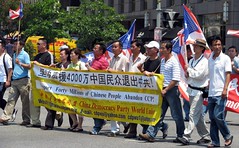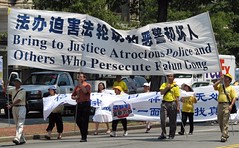Falun Gong Protests China Policy
Falun Gong practitioners met on Friday, July 18th, near the Washington Monument to protest Communist China’s treatment of the peaceful religious sect. Holding signs with statements such as “If you don’t believe what the Communists say about Tibet, why would you believe what they say about Falun Gong?” and “Support 40 Million People Resigning from Chinese Communist Party,” over two thousand people met to raise awareness of the group’s persecution by the Chinese Communists. Officially outlawed July 20th, 1999, the Falun Gong practitioners have weathered a brutal crackdown in both the red Mainland and overseas as well.  The upcoming Olympics have Communist officials scrambling to clean up the street. Zhou Yongkang, Chinese Minister of Public Security, stated in a speech in 2007 that “We must make efforts to create a harmonious society and a good social environment for successfully holding the 17th Communist Party Congress and the Beijing Olympic Games […] We must strike hard at hostile forces at home and abroad, such as ethnic separatists, religious extremists, violent terrorists and ‘heretical organizations’ like the Falun Gong who carry out destabilizing activities.”
The upcoming Olympics have Communist officials scrambling to clean up the street. Zhou Yongkang, Chinese Minister of Public Security, stated in a speech in 2007 that “We must make efforts to create a harmonious society and a good social environment for successfully holding the 17th Communist Party Congress and the Beijing Olympic Games […] We must strike hard at hostile forces at home and abroad, such as ethnic separatists, religious extremists, violent terrorists and ‘heretical organizations’ like the Falun Gong who carry out destabilizing activities.”
 Joel Chipkar, an Italian-American convert to Falun Gong, asserted that “They’ve already arrested 8,000 Falun Gong practitioners from January 2008” in their efforts to eliminate the religious faction.
Joel Chipkar, an Italian-American convert to Falun Gong, asserted that “They’ve already arrested 8,000 Falun Gong practitioners from January 2008” in their efforts to eliminate the religious faction.
Branded as a “heretical organization” by the Communist regime, Falun Gong practitioners not only face the threat of the CCP’s brutal disapproval, but also suffer from a malicious propaganda campaign as well, they are quick to point out. Chipkar noted that “The number one weapon in every genocide campaign in history—every persecution you can think of from Hitler to Rwanda to Bosnia—the number one weapon is hate propaganda.” Falun Gong is no stranger to the malicious propaganda campaign. Chipkar stated that, “Throughout the years they’ve used this hatred to turn—especially the Chinese people—against Falun Gong, by calling Falun Gong anti-China, against China…” Yet he asserts that,
 In light of all the information that has been offered about the group from all parties, the perception of Falun Gong as a political group vindictively bent on destabilizing the CCP is laughable. Members of Falun Gong believe strictly in a karmatic balance of nature—somewhat of a ‘what goes around, comes around’ theology—and believe that actions taken in the physical world have serious repercussions in a spiritual realm. Chipkar attributes these beliefs to the fact that “After 9 years of being slandered, defamed, tortured, killed, persecuted, not once—anywhere around the world, and you’re talking millions of people—has there been one act of violence from a Falun Gong practitioner against a communist party member.”
In light of all the information that has been offered about the group from all parties, the perception of Falun Gong as a political group vindictively bent on destabilizing the CCP is laughable. Members of Falun Gong believe strictly in a karmatic balance of nature—somewhat of a ‘what goes around, comes around’ theology—and believe that actions taken in the physical world have serious repercussions in a spiritual realm. Chipkar attributes these beliefs to the fact that “After 9 years of being slandered, defamed, tortured, killed, persecuted, not once—anywhere around the world, and you’re talking millions of people—has there been one act of violence from a Falun Gong practitioner against a communist party member.”
He went on to explain that “If Coca-Cola was attacking people, or if my neighbor was attacking people, I wouldn’t be looked at as political because I wanted to bring justice to these people.”
Rachel Paulk is an intern at the American Journalism Center, a training program run by Accuracy in Media and Accuracy in Academia.




